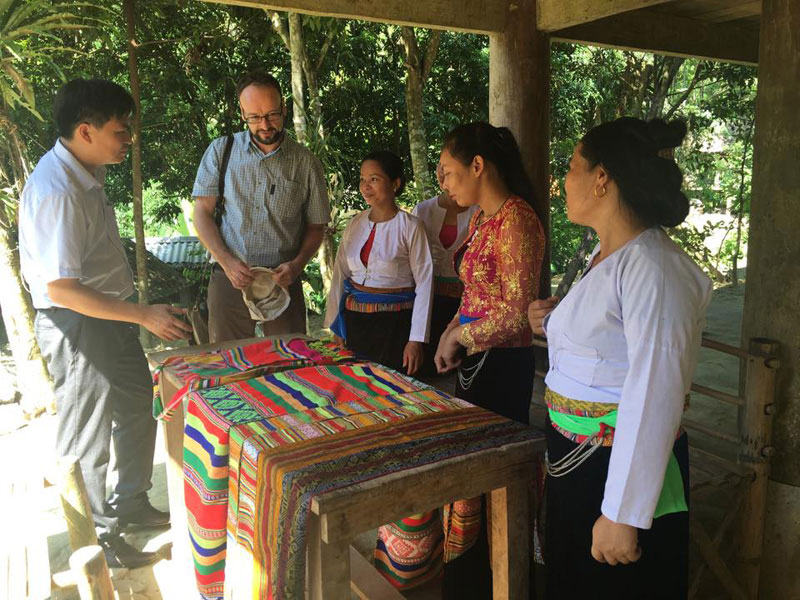
(HBO) – A poverty reduction project has been assisting local people in Tu Do commune, Lac Son district, to improve their livelihoods.
Anyone who once visited Tu Do commune shared the
same view on how low-developed the commune was and how hard to get there as
roads were rough.
However, the project has brought changes. Roads to
hamlets have been asphalted and a number of irrigation works have been built to
support locals’ farming activities. Water supply facilities using water
resources from forests have been installed in residential areas.

The project
has enabled women in Sat Thuong village to preserve their traditional brocade
weaving craft, making it a tourist product to improve their families’ incomes.
The family of Bui Van Nhuan in Chen village is one of the 17
poverty-ridden households that have been taking part in raising honeybees, an
activity of the sub-project 2.1, since 2016.
With the initial aid worth 4 million VND for buying bee breeds, Nhuan has
developed four beehives. Being raised naturally, the bees give high-quality
honey with special aroma and sweetness, which is being sold for 200,000 VND per
liter. He collected
30
liters of honey, which is equivalent to 6 million VND.
A group of brocade weavers in the village received a financial aid worth 42
million VND in 2012 to buy weaving tools together with technical assistance.
The group have so far earned 9-10 million VND a month on average, which enabled
its members to make up for around a half of their family’s income.
Statistics show, the commune has 40 groups formed to engage in the project. The
groups see the involvement of 558 households out of the total 559 households.
All poor households participating have benefited from at least one of the
sub-projects, which involve such trades as bee raising, the breeding of pigs
and cow, and the production of brocades.
The groups have used their income to reinvest in the trade involved and also
cover their family expenses.
Bui Ngoc Thien, Chairman of the Tu Do Commune People’s Committee said together
with the Vietnam Fatherland Front-initiated new rural area building programme
and the Programme 135, the poverty reduction project has accelerated the effort
to eliminate poverty in the locality.
The project has had 118 big and small activities costing over 16 billion VND.
Locals’ average income expanded by 136 percent, from 5.8 million VND in 2010 to
13.7 million VND in 2016, he said./.
Bui Minh
The emulation movement "Hoa Binh joining hands to build new-style rural areas” has been widely spreading, becoming a driving force that motivates the localities to renew rural landscapes and improve the material and spiritual lives of the residents. In this movement, the people play a central role-both as the main implementers and direct beneficiaries of its outcomes.
In response to the global digital revolution, Hoa Binh Newspaper is transforming itself into a modern and multi-platform media hub, blending cutting-edge technology with a restructured newsroom and a new generation of tech-savvy journalists.
Hoa Binh province’s Association of the Elderly recently held a conference to review the project on expanding the inter-generation self-help club model until 2025.
In a move to implement Resolution No. 57-NQ/TW, issued on December 22, 2024 by the Politburo, which targets breakthroughs in science-technology development, innovation, and digital transformation, the Hoa Binh provincial Department of Health has issued a plan to roll out the "Digital Literacy for All” campaign within the local health sector.
An Nghia Commune (Lạc Sơn District) is one of the communes that achieved the tha standard of the national new rural area in 2018. Entering a new development phase, the commune is now trying to meet the criteria for the advanced new rural development. With the strong political will and the public consensus, the commune is gradually overcoming the challenges to reach this goal, aiming for the sustainable development.



